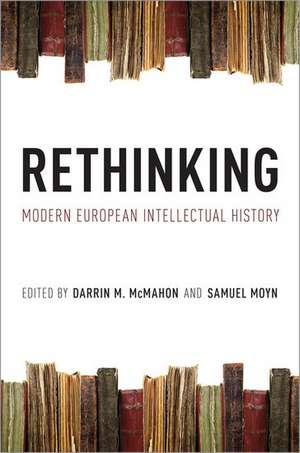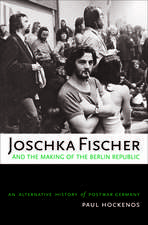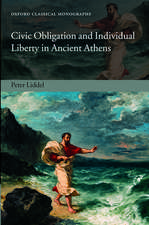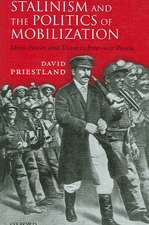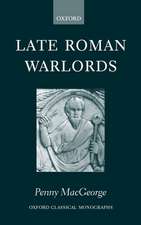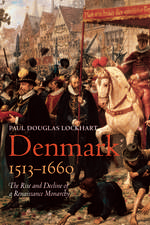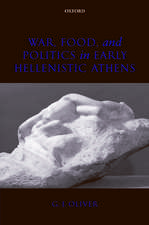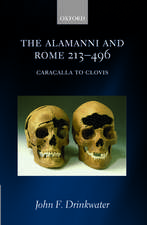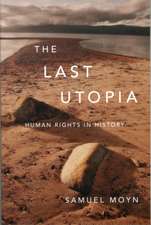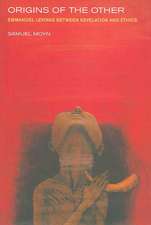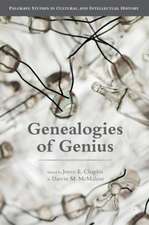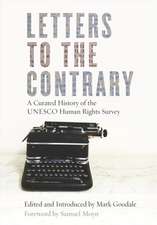Rethinking Modern European Intellectual History
Editat de Darrin M. McMahon, Samuel Moynen Limba Engleză Paperback – 30 ian 2014
| Toate formatele și edițiile | Preț | Express |
|---|---|---|
| Paperback (1) | 350.16 lei 32-37 zile | |
| Oxford University Press – 30 ian 2014 | 350.16 lei 32-37 zile | |
| Hardback (1) | 688.86 lei 32-37 zile | |
| Oxford University Press – 27 feb 2014 | 688.86 lei 32-37 zile |
Preț: 350.16 lei
Preț vechi: 399.48 lei
-12% Nou
Puncte Express: 525
Preț estimativ în valută:
66.100€ • 70.33$ • 55.61£
66.100€ • 70.33$ • 55.61£
Carte tipărită la comandă
Livrare economică 31 martie-05 aprilie
Preluare comenzi: 021 569.72.76
Specificații
ISBN-13: 9780199769247
ISBN-10: 0199769249
Pagini: 320
Dimensiuni: 155 x 231 x 23 mm
Greutate: 0.41 kg
Editura: Oxford University Press
Colecția OUP USA
Locul publicării:New York, United States
ISBN-10: 0199769249
Pagini: 320
Dimensiuni: 155 x 231 x 23 mm
Greutate: 0.41 kg
Editura: Oxford University Press
Colecția OUP USA
Locul publicării:New York, United States
Recenzii
This rich collection of articles explores the relatively recent past of the intellectual history of modern Europe in intriguing ways.... All of the authors are intellectually engaged with what intellectual history offers, intrigued by its future prospects, and aware of possible pitfalls of applying their proposals uncritically....This collection documents a field in an exciting state of evolution with many intriguing paths open to scholars and will be invaluable for anyone interested in understanding the current state of intellectual history. Many scholars will doubtless appreciate the clear paths through recent historiography of the various themes and sub-disciplines this collection treats. They will find a guide, a bibliography, and a thoughtful analysis of topics they might wish to pursue in their own work.
Provocative.... This volume challenges readers to think broadly and critically about historical knowledge, but it also shows specifically how a new generation of intellectual historians is revitalizing an eclectic sub-discipline that never stays the same and never disappears.
At the crossroads of many disciplines, intellectual history has emerged as a vital stimulus to the humanities as a whole. Shedding the residues of cultural condescension, European intellectual history in particular has come to be an endlessly renewable resource for creative thinking across the globe. As this lively volume amply demonstrates, it has a bright future in the hands of a new generation of gifted practitioners.
Over thirty years have passed since the last major attempt to reassess the field of modern European intellectual history. In light of the seeming eclipse of some orientations (such as Marxism), the reformulation of others (such as psychoanalysis), and the newer turns in the field (from the linguistic to the postsecular and the global), the time is certainly ripe for a new assessment. This volume will hold a key place in further efforts to 'rethink' the field both as a collection of significant contributions and as a focal point for constructive, critical debate.
The study of modern intellectual history is gripped by the paradoxes of success. While scholarship in this area has flourished over the past generation, it has become so sprawling an enterprise that its very identity is in question. Perfectly timed to address the growing need for self-reflection in the field, Rethinking Modern European Intellectual History provides at once a map of the discipline, a meditation on its history, and a provocation to new thinking and writing on the history of European ideas. This collection is sure to become a landmark, not just for European intellectual historians, but for anyone with an interest in the history of ideas.
a superb collection ... The power of this book as a whole is to clarify the critical impact intellectual history can have on varied fields of inquiry and its centrality to historiography. The volume demonstrates elegantly that intellectual history remains an effective tool against disciplinary quiescence.
Provocative.... This volume challenges readers to think broadly and critically about historical knowledge, but it also shows specifically how a new generation of intellectual historians is revitalizing an eclectic sub-discipline that never stays the same and never disappears.
At the crossroads of many disciplines, intellectual history has emerged as a vital stimulus to the humanities as a whole. Shedding the residues of cultural condescension, European intellectual history in particular has come to be an endlessly renewable resource for creative thinking across the globe. As this lively volume amply demonstrates, it has a bright future in the hands of a new generation of gifted practitioners.
Over thirty years have passed since the last major attempt to reassess the field of modern European intellectual history. In light of the seeming eclipse of some orientations (such as Marxism), the reformulation of others (such as psychoanalysis), and the newer turns in the field (from the linguistic to the postsecular and the global), the time is certainly ripe for a new assessment. This volume will hold a key place in further efforts to 'rethink' the field both as a collection of significant contributions and as a focal point for constructive, critical debate.
The study of modern intellectual history is gripped by the paradoxes of success. While scholarship in this area has flourished over the past generation, it has become so sprawling an enterprise that its very identity is in question. Perfectly timed to address the growing need for self-reflection in the field, Rethinking Modern European Intellectual History provides at once a map of the discipline, a meditation on its history, and a provocation to new thinking and writing on the history of European ideas. This collection is sure to become a landmark, not just for European intellectual historians, but for anyone with an interest in the history of ideas.
a superb collection ... The power of this book as a whole is to clarify the critical impact intellectual history can have on varied fields of inquiry and its centrality to historiography. The volume demonstrates elegantly that intellectual history remains an effective tool against disciplinary quiescence.
Notă biografică
Darrin M. McMahon is the Ben Weider Professor of History at Florida State University.Samuel Moyn is James Bryce Professor of European Legal History at Colubmia University.
